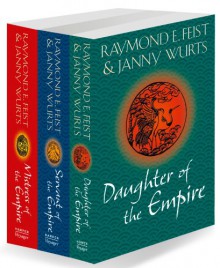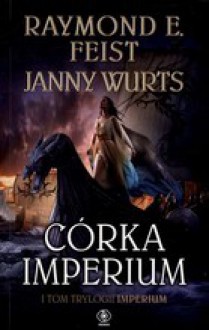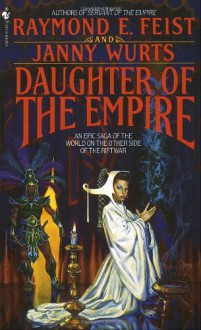
"The mysterious world of Kelewan is encircled by magic, mystery and murder. Here at the heart of the Tsurani empire, Mare, Ruling Lady of the Acoma, leads her people through terror and peril on a truly epic scale. She must contend wth powerful rival houses, strike deals with sinister rebel warriors, and forge a treaty with the enigmatic Cho-ja - a race of alien insectoids. But in order to restore the honour of her house, Mare must marry the son of a deadly enemy - and carry the struggle of her people into the heart of his stronghold..."
A slow steady read. If anyone has read Raymond Feist's books before, you would know that his books are reasonably fast paced and with the right amount of detail. This book is pretty much the opposite. That may be because of Janny Wurts... But personally I don't mind! It was a little slow and there was too much information or too much meaningless information but it was still enjoyable to read. I like the fact that the main character - Mara - a very young woman is thrown into a chaos! She is the daughter of a Lord and has an elder brother, therefore all the teachings of how to be a Ruling Leader were taught to her brother and not her. So when she is unexpectedly the Ruling Lady of Acoma at the age of 16, I think t's fair to say that she had no idea what she was doing or what to do!
But she learnt very quickly, and acts quite smart. She kind of twists people's thoughts, and is able to manipulate people into doing what she wants when needed. Very clever. What's more, she thinks outside the box, while staying with in honour and the rules (The Tsurani value honour nearly more than anything else). She achieve's so much in such a small amount of time and gains honour from many other houses, and gaining the respect of very important people. I've often read that Raymond Feist.. Exploits women in his books... But this.. This is great. Mara is character worth admiring. Whether or not Janny Wurts input in the novel series has anything to do with it, I'm not sure. But they have done a great job with creating a remarkable character.
It's a good story and one that is continued through another two books. I look forward to reading the rest of the series!
If you've read any of Raymond's series (preferably the Riftwar Saga) than I definitely recommend this book.
And if you haven't read any of Raymond Feist's books than I highly suggest that you start with the Riftwar Saga! They are beyond amazing!
THE RIFTWAR SAGA:
Magician
Silverthorn
A Darkness at Sethanon

 Log in with Facebook
Log in with Facebook 








